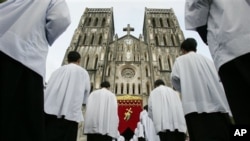There are mixed trends with regard to the state of religious freedom in Vietnam. The most significant differences between these trends, said U.S. Ambassador at Large for International Religious Freedom David Saperstein, is primarily between rural and urban areas.
Religious groups still face onerous registration requirements in order to legally operate, and authorities continue to deny legal recognition to numerous groups. Over the past year, however, authorities have granted several religious groups national-level recognition. While traditionally wary of religious communities providing social services, recent government statements have supported such activities. For example, local authorities in Hanoi have partnered with evangelical house churches to provide drug rehabilitation services.
While this trend is much more encouraging in the cities, many individuals in some rural and ethnic minority areas still face great challenges when seeking to exercise their freedom of religion, particularly those belonging to unregistered religious groups. Saperstein noted that local officials in many areas continue to harass, detain, and intimidate individuals gathering for worship at independent meeting points, and refuse to provide many groups with legal registration. Ethnic minority groups in the Central Highlands region, often called Montagnards, are one such example.
On a recent visit to the Central Highlands, Ambassador Saperstein noted that after his meetings, police detained some of the local religious leaders who had met with him. Such harassment is unacceptable, said Ambassador Saperstein.
Despite these concerning incidents, the government of Vietnam has made progress in other areas. Notably, said Saperstein, there is a new law on religion and belief under consideration in Vietnam. Under current regulations, nearly all religious activities require advanced approval by the government. There are indications that some provisions in the new draft law move away from a restrictive “approval-based” system towards a “notification-based” system. Under this new model, a religious group would simply notify government officials of a planned activity instead of being required to secure formal approval. Saperstein views this reform, if enacted, as an important step forward.
The U.S. government will continue to encourage Vietnam to move its laws and practices in a direction that will ease restrictions upon individuals on account of their religious beliefs. Everyone should be entitled to religious freedom no matter where they live.














